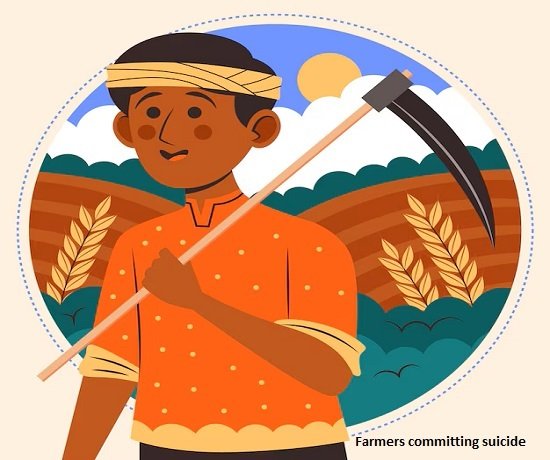
Introduction:
A committing suicide multimodal strategy that targets farmers’ emotional and financial difficulties is required to fight this disaster.
The lives of individuals impacted can be significantly improved by programs that offer community support, mental health resources, and financial knowledge.
We can make an effort to reduce the stigma related to mental health and guarantee that farmers have access to the assistance they require by cultivating a culture of understanding and support.
Recognizing the humanity behind these numbers and fighting for the welfare of individuals who are so important to our food systems is imperative.
Farmer suicides in India are a complex and deeply concerning issue caused by a combination of social, economic, and environmental factors. Below are some of the primary reasons:
1. Financial Distress
-
Debt Burden
: Many farmers rely on loans to buy seeds, fertilizers, and equipment. Due to crop failures or low prices, they struggle to repay these loans, leading to a cycle of debt.
-
High-Interest Loans
: Farmers often borrow from private moneylenders who charge exorbitant interest rates.
2. Crop Failures
-
Unpredictable Weather: Droughts, floods, and unseasonal rains can destroy crops, leaving farmers no income.
-
Climate Change: Changing weather patterns have made farming increasingly unpredictable and difficult.
-
Poor Irrigation Facilities: Many farmers depend on rainfall due to the lack of proper irrigation infrastructure, increasing the risk of crop failure.
3. Low Agricultural Prices
-
Fluctuating Market Prices: Farmers often don’t get fair prices for their produce due to middlemen and lack of direct market access.
-
Lack of Government Support: While the Minimum Support Price (MSP) is announced for some crops, not all farmers benefit from it because procurement systems are inadequate.
4. High Cost of Farming
-
Expensive Inputs: The cost of seeds, fertilizers, pesticides, and fuel has been rising, making farming more expensive.
-
Use of Genetically Modified Seeds: GM seeds, particularly in cotton farming, are more expensive, and when they fail, farmers face huge losses.

5. Land Fragmentation
-
With each generation, land is divided among heirs, leading to smaller and less economically viable farms. This limits productivity and profitability.
6. Lack of Alternative Employment
-
Farmers often have no alternative sources of income. In case of crop failure, they face complete financial ruin.
-
Migration to cities for work is not always feasible, as many are unskilled for urban jobs. Farmers will decide to commit suicide.
7. Social Pressures
-
Marriage and Dowry: In rural areas, committing suicide, farmers often take loans for weddings and dowries, adding to their financial burden.
-
Social Stigma: The shame of being unable to repay loans or failing in farming can lead to severe mental stress and hopelessness.
8. Mental Health Issues
-
The constant stress of farming, combined with financial pressure and societal expectations, can lead to depression and other mental health issues.
-
There is a lack of access to mental health services in rural areas.
Government Initiatives and Challenges
While the government has introduced schemes such as:
-
Loan Waivers
-
PM-KISAN (income support)
-
Crop Insurance Schemes (Pradhan Mantri Fasal Bima Yojana)
The implementation and reach of these programs are often limited, and many farmers do not benefit due to bureaucratic hurdles.
Conclusion:
Farmers committing suicides in India highlight the urgent need for systemic reforms in agriculture, better access to credit, improved market linkages, enhanced irrigation infrastructure, and mental health support. Addressing this issue requires a multi-pronged approach involving government, the private sector, and civil society.








































